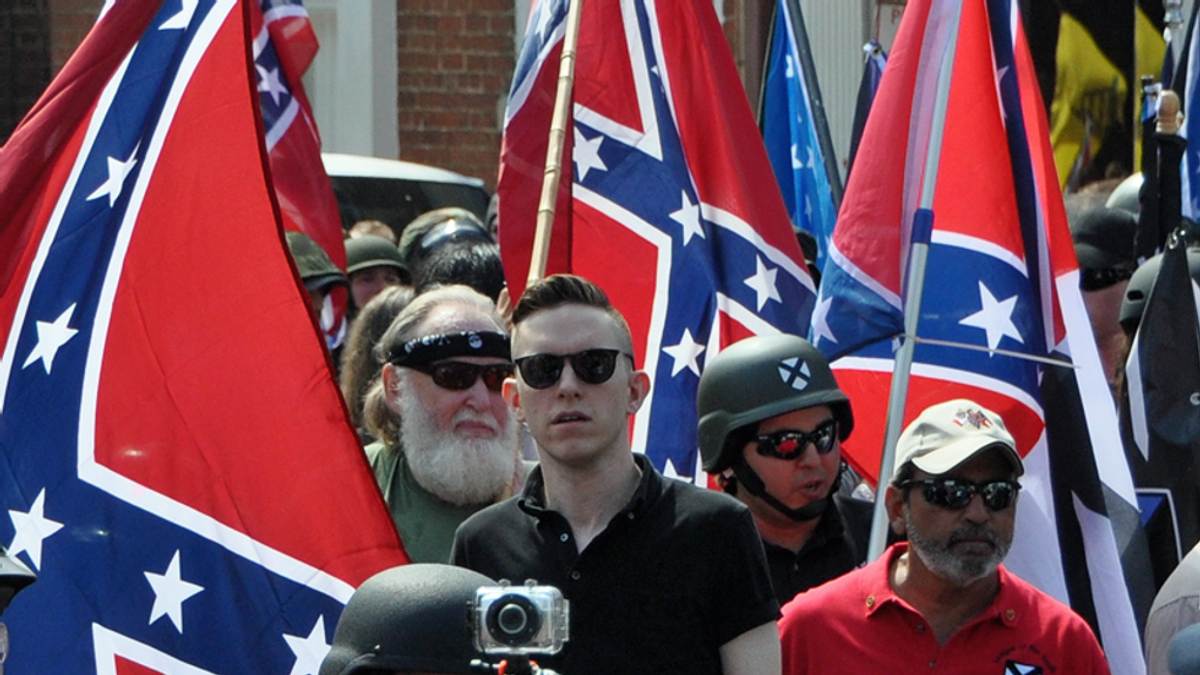
Lawyers for nine people injured in the 2017 Unite the Right rally laid out their case in federal courtroom in Charlottesville that organizers of the violent white nationalist gathering conspired to commit racially motivated violence.
"They are going to tell their stories directly to you because they believe the truth about what happened in Charlottesville must be told," Karen Dunn, one of the lead attorneys, told the 12 jurors. "These plaintiffs will tell you this is a case about justice and accountability — accountability for these defendants who planned and perpetrated violence thinking they would always get away with it."
In a riveting 90-minute opening statement that included video footage, audio recordings, Dunn and fellow lead attorney Roberta Kaplan presented a searing diorama of a white nationalist movement in 2017 bristling with violence in text messages exchanged by leaders and escalated into eliminationist lust as they hurtled towards the appointed date of Aug. 11 and 12 in Charlottesville.
They told the jurors about the defendants — locals that included a pastor, a landscaper and students at the University of Virginia — who took a nonviolent stand against white supremacy and were subjected to ghastly attacks, racial slurs and a car attack that left them with lasting injuries.
"We will show you that the violence on August 11th and August 12th was no accident," Dunn told the jurors. "They planned for violence. They executed violence. They celebrated and ratified the violence, after the fact. That is what we're going to prove to you."
Emphasis on prior planning, acts of violence by some of the defendants and celebratory statements by the organizers after the fact provided a common refrain in the plaintiffs' opening statement, underscoring that they need to prove that the defendants shared an unlawful objective to prove a conspiracy, even if other aspects of their activity such as publicly demonstrating to promote their white supremacist and anti-Semitic views are protected under the First Amendment.
In her portion of the opening statement, Dunn attempted to draw a tight connection between leaders like Richard Spencer and Jason Kessler, respectively the most prominent white nationalist in the country at the time and the rally's local organizer, and James Fields, an Ohio man who sped his Dodge Challenger into a peaceful antiracist march, killing Heather Heyer.
Dunn told the jury that when Kessler decided to organize Unite the Right, he reached out to three men: Spencer; Matthew Heimbach, leader of the Traditionalist Worker Party; and Elliott Kline (then known as Eli Mosley sp), an organizer with Identity Evropa. Kline, who helped organize the rally alongside Kessler, reached out the Vanguard America, another neo-Nazi group.
"James Fields has admitted he was inspired by Richard Spencer to go to Charlottesville," Dunn said. "He marched with Vanguard America. He was wearing the Vanguard America uniform. He carried a Vanguard America shield. Dillon Hopper was the leader of Vanguard America and had communications with Kline. Thomas Rousseau also had communications with Kline and took control of Vanguard America just before August 12th. He led the soldiers on the ground."
Neither Hopper nor Rousseau are defendants, although the defunct Vanguard America is.
Previewing the plaintiffs' case that the defendants used the First Amendment as a ruse to cover for racist violence, Dunn quoted from a text message Kessler sent in response to Spencer's confirmation that he would speak at Unite the Right: "We're raising an army, my liege, for free speech, but the cracking of skulls if it comes to it."
Dunn also previewed testimony from Samantha Froehlich, who is the former girlfriend of Elliott Kline.
"Mr. Kline was actually working for an exterminator, as unbelievable as that sounds," Dunn said. "Samantha Froelich, she will testify that Mr. Kline wanted to kill Jews instead of cockroaches. He would say, 'Gas the kikes forever.'"
Dunn cited messages exchanged among the defendants and co-conspirators discussing using sticks and shields as weapons, and celebrating weaponizing cars, including a message by defendant Matthew Heimbach with the hashtag #HitTheGas.
"While watching someone run over counter-protesters may seem shocking to most of us, you will come to see it was reasonably foreseeable that a car would run over counter-protesters," Dunn said.




